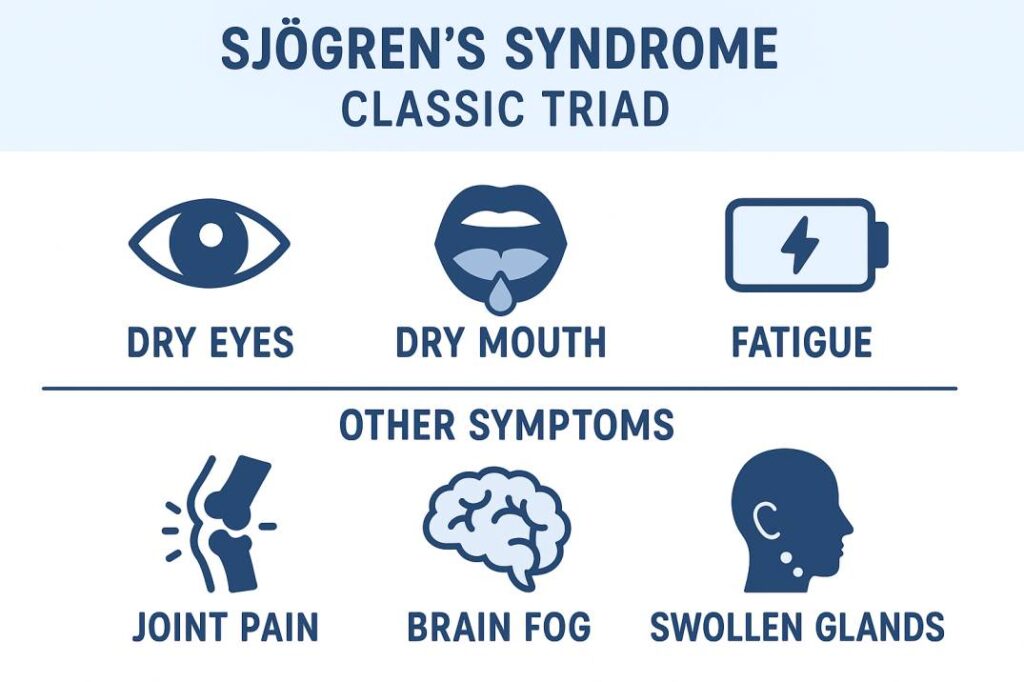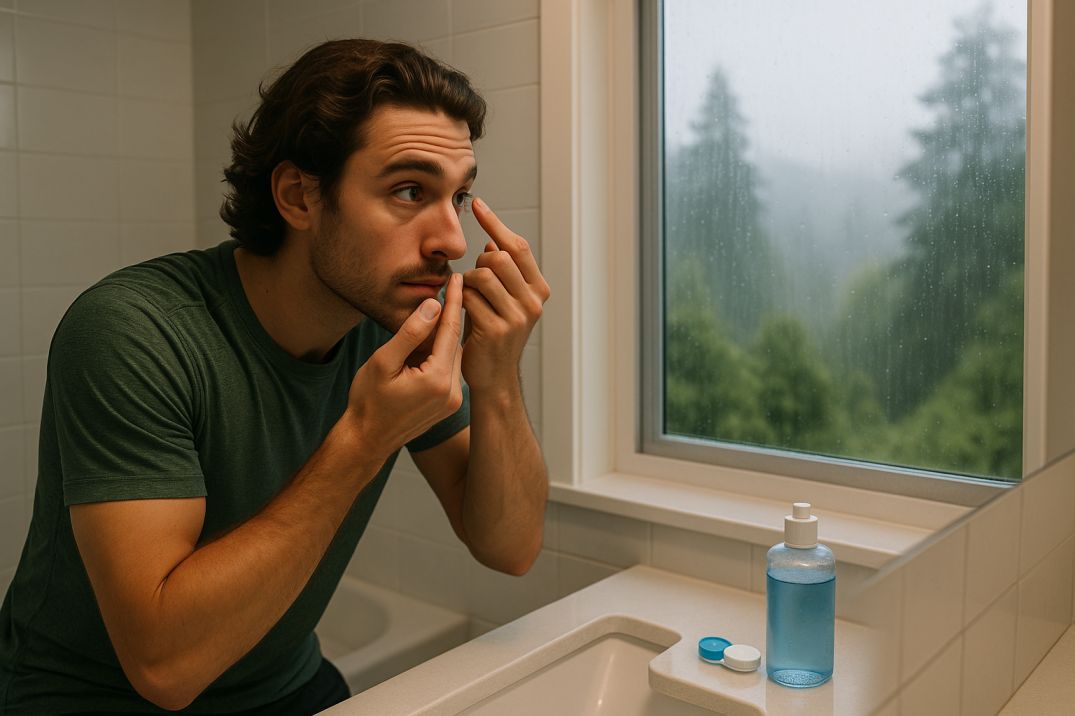Sjogren’s Syndrome
Sjögren’s syndrome isn’t just dry eyes—it’s a complex autoimmune disease that affects your entire body. Discover key symptoms, diagnosis steps, and expert care strategies in Seattle.
Key Takeaways: Understanding Sjögren’s Syndrome
-
Sjögren’s syndrome is a systemic autoimmune disorder, not just dry eyes and mouth—it can affect lungs, kidneys, nerves, and overall quality of life.
-
Women over 40 are most commonly affected, but the disease can appear at any age and often coexists with conditions like lupus or rheumatoid arthritis.
-
Classic symptoms include dry eyes, dry mouth, and fatigue, but patients may also suffer joint pain, brain fog, skin rashes, and breathing issues.
-
Seattle-based diagnosis requires a multi-specialist team including ophthalmologists, rheumatologists, and ENT doctors for comprehensive care.
-
Effective treatment includes a tiered approach: artificial tears, omega-3s, prescription drops, saliva stimulants, and immune-modulating drugs.
-
Seattle’s humid climate offers some natural relief, but patients should use humidifiers and monitor wildfire-season air quality.
-
Lifestyle changes—like an anti-inflammatory diet and workplace accommodations—enhance comfort and daily functioning.
-
Serious complications include increased risk of lymphoma and neurological issues; patients should watch for red-flag symptoms like vision loss, night sweats, or swollen lymph nodes.
Understanding Sjögren’s Syndrome: An Autoimmune Disorder Targeting Moisture
Sjögren’s syndrome is a chronic autoimmune disorder where your immune system mistakenly attacks moisture-producing glands, severely reducing tear and saliva production. Named after Swedish ophthalmologist Dr. Henrik Sjögren, it primarily affects women over 40 but can occur at any age.
Crucially, Sjögren’s is more than severe dry eye disease—it’s a systemic condition that can damage organs (lungs, kidneys, nerves), significantly impacting daily comfort for Seattle patients. It presents in two forms:
-
Primary Sjögren’s: Develops independently.
-
Secondary Sjögren’s: Occurs alongside other autoimmune diseases like rheumatoid arthritis or lupus.
Promising research in the Journal of Leukocyte Biology highlights autoantigen-specific immunotherapies as emerging targeted treatments, advancing beyond traditional approaches.
Recognizing Sjögren’s Syndrome Symptoms: Beyond Dry Eyes
Sjögren’s syndrome symptoms extend far beyond dry eyes and mouth. Seattle patients at Cannon EyeCare commonly experience:
The Classic Triad:
-
Dry Eyes (Xerophthalmia): Persistent burning, grittiness, or sand-like irritation
-
Dry Mouth (Xerostomia): Difficulty swallowing, speaking, or tasting food
-
Debilitating Fatigue: Exhaustion unrelieved by rest
Systemic Symptoms (Whole-Body Impact):
-
Joint/muscle pain (hands, wrists, ankles) with slow recovery
-
Brain fog and concentration difficulties
-
Skin rashes and sun sensitivity
-
Swollen salivary glands (jaw area)
-
Persistent cough or breathing issues
A 2024 Arthritis Research & Therapy study found 92% of patients had dry eyes and 94% dry mouth, while 30-39% developed systemic symptoms that severely reduced quality of life.
Diagnosing Sjögren’s Syndrome in Seattle: Your Step-by-Step Guide
Navigating Sjögren’s diagnosis requires a collaborative approach. Seattle’s healthcare network offers specialists for precise evaluation:
-
Ophthalmologists (like Cannon EyeCare) for dry eye evaluation and corneal damage
-
Rheumatologists for systemic symptoms (joint pain, fatigue)
-
ENT Specialists for salivary gland dysfunction
Essential Diagnostic Testing at Cannon EyeCare:
Blood Tests:
-
Anti-SSA/Ro & Anti-SSB/La antibodies (key Sjögren’s markers)
-
Rheumatoid factor, ANA, and inflammatory markers
Dry Eye Assessments:
-
Schirmer’s test (tear production measurement)
-
Tear break-up time
-
Corneal staining
Salivary Function Analysis:
-
Salivary flow rate
-
Sialography (salivary duct imaging)
Sjögren’s Syndrome Treatment at Cannon EyeCare: Personalized Care for Seattle Patients
Dry Eye Management:
Our Seattle clinic uses a tiered approach:
First-Line Care:
-
Preservative-free artificial tears (every 1–2 hours)
-
Daily warm compresses + lid hygiene
-
High-quality omega-3 supplements (reduce inflammation)
Advanced Solutions:
-
Prescription drops: Restasis®, Xiidra®, Tyrvaya®
-
Punctal plugs (tear conservation)
-
Custom autologous serum tears
Dry Mouth Relief:
-
Prescription stimulants: Pilocarpine (Salagen®), Cevimeline (Evoxac®)
-
Sugar-free gum/lozenges
-
Artificial saliva substitutes
-
Critical: Meticulous dental hygiene (prevents cavities/pain)
Systemic Symptom Control:
For joint pain, fatigue, or organ involvement:
-
Hydroxychloroquine (first-line immune modulator)
-
Methotrexate (moderate-severe cases)
-
Biologics like Rituximab® (targeted therapy)
-
Short-burst corticosteroids for flares (monitored by your Seattle rheumatologist)
Thriving with Sjögren’s in Seattle: Climate, Workplace & Lifestyle Tips
Navigating Seattle’s Climate:
Leverage Advantages:
-
Higher humidity (gentler on dry eyes/mouth vs. arid regions)
-
Milder winter UV exposure
Mitigate Challenges:
-
Combat indoor heating dryness with home/office humidifiers
-
Monitor air quality during wildfire season (use HEPA filters)
Workplace Accommodations:
Seattle employers often support chronic conditions. Request:
-
Personal desk humidifiers
-
Scheduled breaks for eye drops/hydration
-
Ergonomic adjustments (reduce joint strain)
-
Flexible hours during symptom flares
Anti-Inflammatory Diet for Sjögren’s:
Focus On:
-
Omega-3-rich wild PNW salmon/sardines
-
Leafy greens (kale, spinach) & colorful veggies
-
Walnuts, chia seeds, flaxseed
-
Turmeric/ginger (add to teas/smoothies)
Limit:
- Processed sugars
- Excess caffeine (dehydrating)
- Alcohol (reduces saliva)
Serious Sjögren’s Complications: When Seattle Patients Need Immediate Care
Heightened Lymphoma Risk:
Research reveals a 4–7x higher risk of non-Hodgkin lymphoma in Sjögren’s patients (NIH, 2024). Seek evaluation for:
-
Sudden salivary gland enlargement
-
Persistent swollen lymph nodes
-
Unexplained weight loss or night sweats
Neurological Complications:
May include:
-
Peripheral neuropathy (limb numbness/tingling)
-
Severe cognitive decline (beyond routine “brain fog”)
-
Seizures or central nervous system disorders
Urgent Symptoms Requiring Immediate Attention:
Contact your Seattle rheumatologist or visit urgent care if you experience:
-
Vision Threats: Severe eye pain or sudden vision changes
-
Systemic Signs: High fever (infection risk)
-
Respiratory/Cardiac: Chest pain or breathing difficulty
-
Musculoskeletal: Severe joint swelling/immobility
Sjögren’s syndrome can impact far more than tear or saliva production—it can affect your entire quality of life. With early diagnosis, personalized treatment, and supportive lifestyle changes, Seattle patients can effectively manage symptoms and reduce serious complications.
Take the next step toward relief.
If you’re experiencing persistent dry eyes, joint pain, or unexplained fatigue, schedule a comprehensive evaluation with the specialists at Cannon EyeCare today. Your comfort and long-term health deserve expert care.
FAQs
-
Sjögren’s syndrome is a systemic autoimmune disease affecting moisture-producing glands. It affects 4 million Americans, making it one of the most common autoimmune conditions




